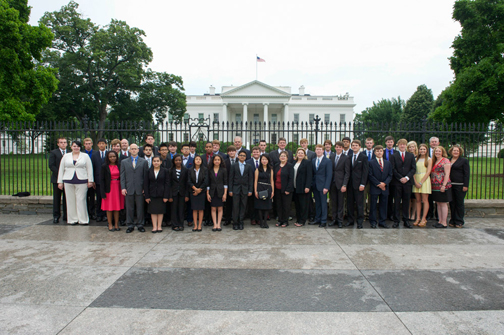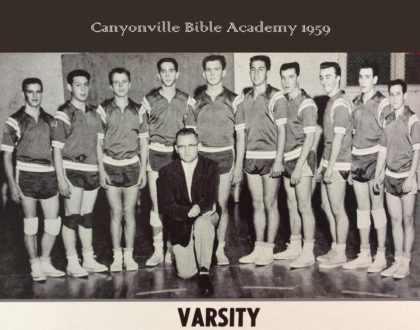Two-Time National Champions Featured in Wall Street Journal!

by admin
From time to time people have raised questions about the advisability of stock market and investment competitions for students. Most recently, Jason Zweig, Wall Street Journal writer, did a column on the topic (“Should We Teach Teenagers to Trade?”). He ended the May 9th, 2015 essay with the words, “If your own children are studying the stock market in school, you had better ask them what they have been learning. They might need to be deprogrammed.”
As a high school teacher who has used stock games for many years, I feel that Mr. Zweig and others have raised important questions that are deserving of an extended answer from a teacher’s perspective. Let me give it a try…
To Begin With...
A stock game is a competition typically conducted on the internet using real-time stock prices and runs 10 to 14 weeks. Students are given a hypothetical amount of money to invest, often $100,000, and a set of rules regarding eligible stocks, short selling, diversification, margin, etc.
First, I present a general introduction to investing and investments. In this section of the course, I show the complete range of options from negative interest rates now seen in Europe up through the highest interest paying junk bonds. Precious metals, art, currencies, commodities and similar options get a mention. The emphasis in this introductory section of the course is on the trade-off between risk and return and the critical role played by inflation on realized investment returns.
In the second phase of the course, we then do an introduction to the stock market, presenting it as probably the best way to achieve a rate of return that is well above inflation but with manageable and acceptable levels of risk. Topics include such things as the history of stocks, terms, concepts, indices, exchanges, careers, and the role of stocks in free market capitalism.
The third phase of the stock market unit covers how to invest in stocks. This is the heart and soul of the program and is covered in some depth. It is here that students learn not just about the market but how do to it. Among the topics covered are fundamental and technical investing, allocation, risk management, types of stocks, diversification, and stock analysis.
The two to three week stock market course is now complete and the students are more than a little ready to have some fun and see if what I have been teaching them really works.
What Happens Next
It’s Time For The Stock Game
I believe that the stock competition is a very specific INVESTING PROBLEM that has two central elements: It has an extremely short investing window and high risk strategies tend to get rewarded.
With real life investment dollars, risk management is a cornerstone. In a game where there is no penalty for losing, minimizing risk is hardly a rational plan. Because my students have a good understanding of risk, tools, and strategies, when I explain the options and rules of the game they are well prepared to compete. But on an almost daily basis I am reminding them not to confuse real life money with game money.
It appears to me that the large majority of kids in investing competitions have not been shown how to win. Approximately 8-% of participants end up within + or – 5% of the S&P 500 return at the end of the game. I would consider that to be highly frustrating for both the teachers and the students when they see other schools making returns that sometimes are well above the change in the indices.
The GOAL is to help my students come up with a strategy that has a CHANCE TO WIN. Would you rather have your child buy a couple of blue chip bank stocks that have zero chance to win the game, or would you rather have her take either the long or short position in oil related stocks and have a chance to finish among the leaders? (And if she gets clobbered by taking the wrong side of her oil bet and loses half her money, don’t you think that can possibly be an even more valuable learning experience than winning the game?)
Some Additional Interesting Facts
Hillary Clinton made a 10,000% return in 10 months in 1978-9 investing in cattle futures. George Soros reportedly made $1 billion in a single day in 1992 shorting currencies. Most of Bill Gates wealth was not built by diversifying by by owning a billion shares of one company, Microsoft.
Some pundits may not like students being exposed to these kinds of stories. It might teach them to take on dangerous risk levels. But if we balance this with stories of Enron, Bernie Madoff, and the Dotcom bubble, wouldn’t this be a far more interesting and intellectually honest stock market course? When some of my teams inevitably make decisions that crash and burn, why am I not able to use those as teaching moments on how not to invest?
Let’s lighten up on the students. It’s a game. Have some fun. Play to win. If you perceive we are in a bear market and you think the best strategy is to sell short – just do it… even though, in real life, this technique may cause you to lose more than your initial investment. If you think the best game strategy is to use margin – just do it… even though Jim Cramer says you are not allowed to watch his CNBC program if you engage in such high risk behavior.
FAQ
Aren't Stock Market Games Imperfect?
Absolutely. Perfect would be a multi-year competition where participants would risk real money. Obviously, this is never going to happen. It’s axiomatic that no simulation is ever perfect. This one is not, but for a good teacher it can be a very good tool.
Do Stock Games Reward High Risk Behaviors?
Of course. But that’s life. You ask the cute girl out for a date. You bought 1,000 shares of a wobbly Apple stock on the day after Steve Jobs was rehired. Your football team, trailing with two minutes to go, does an onside kick.
Can Stock Games Be Used Responsibly?
I really do think so. Just don’t forget to teach BOTH real world investing along with the game strategies and keep reminding the participants not to get the two concepts mixed up.
At Canyonville Christian Academy we have a T.D. Ameritrade real money account for the class. You might guess that stocks bought with actual fund money are a tad less speculative than those we select for the competition.
Do the Game Organizers Promote Responsible Teaching?
Certainly. In Oregon, the game sponsors hold seminars for teachers where a balanced approach to investing and competition is promoted. Also, the past several years, the game sponsors have tightened the rules to encourage more diversification and limiting the use of margin.
What Is Your Game Strategy?
In the game, I teach my students to use maximum margin, avoid blue chip stocks, and concentrate holdings in a single industry or investment idea. All these things are, to me, prudent game strategies. But my students must also be able to explain on a test the danger of these strategies.
Who Supports The Stock Market Games
Stock Competition Supporters
While I am aware of the fallacies of “appeal to authority,” I think that providing a list of some of the organizations that support the stock competition might have some value. (Since I’m from Oregon, my examples will lean in that direction.)
- The U.S. Congress
- SIFMA
- CNBC
- Wall Street Journal, Barron's, & Morningstar
- The Oregon Council of Economic Education
- Morgan Stanley & Wells Fargo
- The University of Oregon School of Business
- Portland Securities Dealers Association
- Other Sponsors
The U.S. Congress, the full House and Senate, is a very strong supporter of the Capitol Hill Challenge, the national stock competition. Their support comes on a number of levels and goes back many years. Students from Canyonville Christian Academy have met with Oregon Senator Ron Wyden and the House member from our district, Peter Defazio in Washington D.C.
An estimated 15 million students have participated in investing competition sponsored by SIFMA (Securities Industry and Financial Markets Association), the leading trade group representing securities firms, banks and asset managers. These events include national and statewide competitions. This prestigious group must believe strongly in the value of the program to make the level of effort and financial commitment that they do.
The CNBC television network, the premier stock market channel, sponsors an annual “Million Dollar Portfolio Challenge.” This is open to students and prizes have included $1,000,000 in cash, a Maserati Gran Turismo, and international vacations.
These stock publications/organizations of the first order regularly publish rankings of stocks, investment analysts, investment advisers, mutual funds, hedge funds, etc. While technically not a “stock game,” these focus the eyes of investors on hot stocks and sectors, and they reward money managers who compile the best records. Sounds a little like a “stock game” to me.
The Oregon Council of Economic Education are the lead sponsors for the Oregon game. Members of their board have included distinguished college professors, the Oregon state economist, representation from the Federal Reserve Bank in San Francisco, and professionals from the securities industry.
Morgan Stanley and Wells Fargo Securities provided organizational support for an awards banquet for Oregon game winners, which was recently held at the Portland Doubletree/Hilton Hotel.
The University of Oregon School of Business (now the Lundquist School of Business). As an Oregon Duck business major, I participated in multiple investing competitions and simulations.
Portland (Oregon) Securities Dealers Association provides financial support for the Oregon state game.
Past game sponsors in the state of Oregon have included Portland State University, Mt. Hood Community College, Umpqua Bank, and the Oregonian, the leading newspaper in Oregon.
Ending Thoughts
I believe it is entirely possible that there is a fallacy in the criticism of the schools and teachers who have students who participate in the investment competitions. While it is possible that there are some poor teaching practices going on somewhere in the country, I have not seen this and the game skeptics have provided no evidence that this is actually happening. Most of my colleagues and I would welcome a critic to sit in on a class or two to see how stocks are actually being taught.
At a more personal level, after multiple mind-numbing college stock market and investment courses (I was a finance major), I was fortunate enough to encounter a professor who turned stocks into a game which was more challenging and interesting than anything I’d ever encountered in a classroom. That teacher opened doors for me and enriched my life. I am enjoying being that teacher now.
Recommended Posts

Richard “Dick” Sterling Sr ’59
May 18, 2022

OPEN HOUSE 2021 – Canyonville Academy
March 18, 2021

INTERNATIONAL SUCCESS; ONE STUDENT’S JOURNEY ACROSS THE WORLD
February 10, 2021


